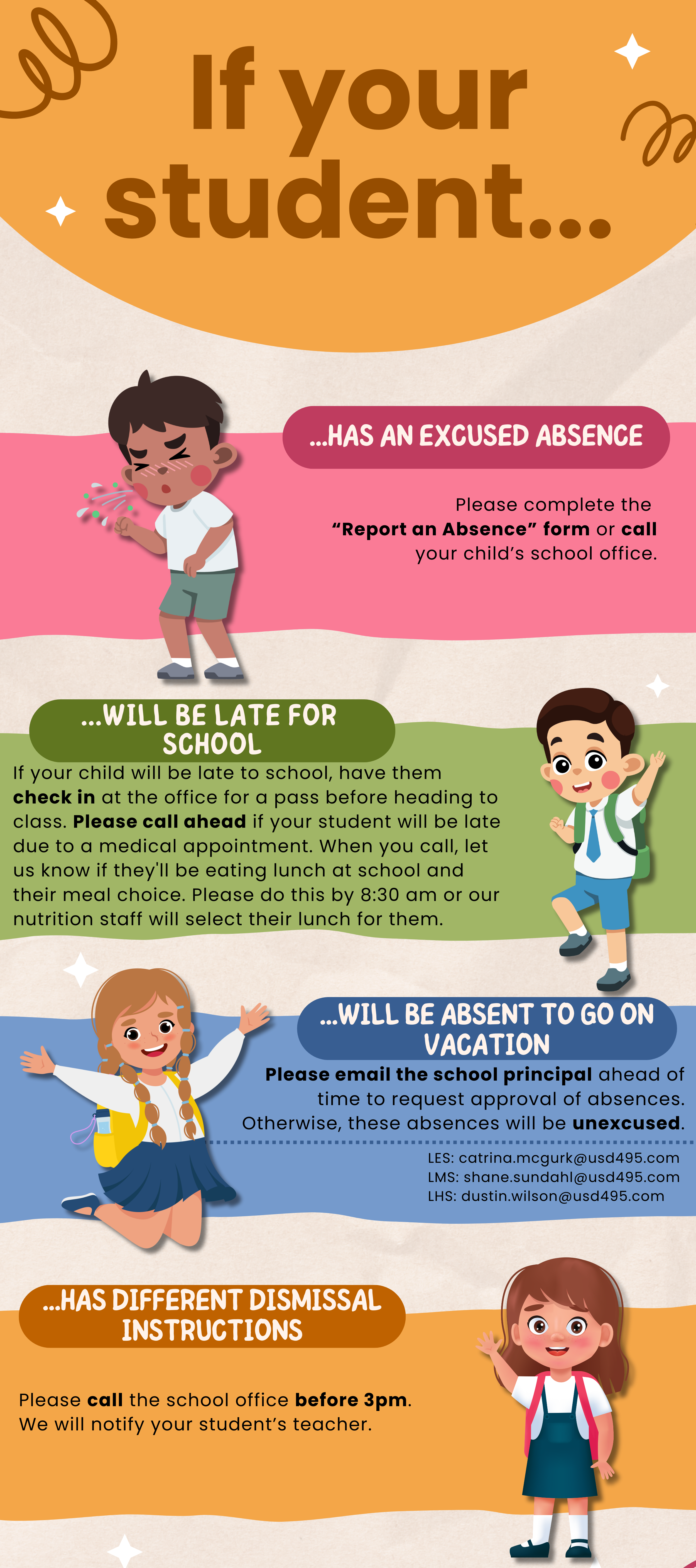
TRUANCY CRITERIA
Applies to children ages 7-18.
Applies to children under the age of 7 once the child has been enrolled in school.
A student is truant from school if he/she is absent without a valid excuse.
UNEXCUSED ABSENCES ADD UP!
3 Unexcused Consecutive Absences: Truancy is filed with the appropriate authorities.
3 Unexcused Absences Per Semester: Letter is mailed home to inform parents or guardians of the absences.
5 Unexcused Absences Per Semester: Truancy is filed with the appropriate authorities.
When an administrator at USD 495 files a truancy report with the Pawnee County Attorney, they also file a report with the Kansas Department of Children and Families (DCF) simultaneously.
EXCUSED ABSENCES DOCUMENTATION
0-9 Excused Absences Per Semester: No documentation is needed.
9 or More Excused Absences Per Semester: Documentation from a doctor or court is required for the absence to be considered excused.
*Chronic health issues should be documented in our nurse’s office.
PAWNEE COUNTY DISTRICT ATTORNEY AND TRUANCY
Under Kansas state law, children between the ages of 7 and 18 must attend school. A student is considered "truant" if they are absent without an excuse for a significant portion of the school day for three consecutive days, five days in a semester, or seven days in a school year. Schools are required to notify parents or guardians of these absences. If additional unexcused absences occur, the school must report the truancy to the District Attorney's Office.
Upon receiving a truancy referral, the District Attorney's Office has discretion in processing the case. Truancy cases are prosecuted as Child in Need of Care cases, and the Kansas Department of Children and Families (DCF) may become involved if necessary. If a truancy case proceeds to District Court, the judge can create a plan to address the child's needs and ensure school attendance. This plan may include informal referrals to services or a court-monitored formal truancy plan.
UNDERSTANDING THE IMPACT OF CHRONIC ABSENTEEISM
Academic Impact: Chronic absenteeism serves as an early warning sign for schools, signaling that a student's absences are accumulating. Beginning in kindergarten, these absences can significantly impact academic performance. Research indicates that students who are chronically absent are less likely to read at grade level by third grade, tend to score lower on standardized tests, and face higher suspension rates in middle school. By ninth grade, chronic absenteeism is a more reliable predictor of high school dropout rates than eighth-grade test scores.
Social and Emotional Impact: Chronic absenteeism can lead to significant social and emotional challenges for students. Frequent absences often result in feelings of isolation and disconnection from peers and teachers, essential for developing social skills and supportive relationships. This isolation can worsen existing mental health issues like anxiety or depression, making it even harder for students to attend school regularly.
WHAT YOU CAN DO
Establish a Routine: Set a regular bedtime and morning routine to ensure your child gets enough rest and starts the day smoothly.
Prepare Ahead: Finish homework and get a good night's sleep. Prepare for school the night before by organizing materials and setting out clothes.
Check Health: Only keep your child home if they are truly sick. Sometimes, stomach aches or headaches might be signs of anxiety rather than illness. If you're unsure if your child is running a fever or should stay home, bring them to the school nurse before school starts, and we can help make the determination.
Plan Appointments: Try not to schedule appointments and extended trips during school hours.
Have a Back-Up Plan: Have a plan for getting your child to school if something unexpected happens. Ask a family member, neighbor, or a friend for help if needed.
Track Attendance: Use Skyward Family Access to see how many days your child has missed.
Talk About It: Talk to your child about why attending school regularly is important for their learning and future.
Communicate with Teachers: If you notice sudden changes in your child's behavior, talk to their teachers to see if something at school is causing it.
Encourage Activities: Support your child in joining after-school activities like sports or clubs to help them feel more connected to school and their peers.
WE'RE HERE FOR YOU
We understand that life happens—whether it's dealing with health issues or family matters. If your family is facing obstacles or you just want to discuss your child's attendance, please reach out to the school principal. Your involvement is crucial in ensuring that your child gets the most out of their school experience. Together, we can work towards helping your child succeed and make the most of their education.

